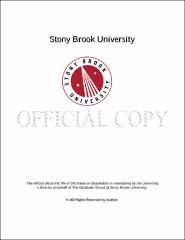| dc.identifier.uri | http://hdl.handle.net/11401/76619 | |
| dc.description.sponsorship | This work is sponsored by the Stony Brook University Graduate School in compliance with the requirements for completion of degree. | en_US |
| dc.format | Monograph | |
| dc.format.medium | Electronic Resource | en_US |
| dc.language.iso | en_US | |
| dc.publisher | The Graduate School, Stony Brook University: Stony Brook, NY. | |
| dc.type | Dissertation | |
| dcterms.abstract | Through a comparative reading of philosophical and literary texts, I examine the distinction between the projects and practices of philosophy and literature. I argue that, like philosophy, novels make arguments and explicitly engage the range of philosophical questions; and like literature, essential elements of philosophy include aesthetic considerations. Moreover, the presumed distinction between philosophy and literature does a disservice to both. If we overlook the literary qualities of philosophy, we risk relegating to the margins important contributions to traditional philosophical problems; and if we overlook the philosophical qualities of literature, we risk passing over some of the most profound elements of art and culture. This claim, however, implies far more than that philosophers should aspire to be better writers, or that scholars should read more fiction and poetry. I conclude with a sketch of the ethical and political implications of this project. If " literature" is shorthand for essential philosophical considerations, philosophy will need to redraw the cultural boundaries of the philosophical community, and reevaluate what kinds of discourses and texts contribute to traditional theoretical projects. Specifically, voices explicitly defined by their particularity--e.g. race, gender, sexuality, nationality, socio-economic position, and historical situation--will increase prominence, and productively decentralize and democratize the practice and project of philosophy. | |
| dcterms.available | 2017-09-20T16:50:49Z | |
| dcterms.contributor | Craig, Megan | en_US |
| dcterms.contributor | Rawlinson, Mary C | en_US |
| dcterms.contributor | Casey, Edward | en_US |
| dcterms.contributor | Harvey, Robert. | en_US |
| dcterms.creator | Jaima, Amir Rauf Alduha | |
| dcterms.dateAccepted | 2017-09-20T16:50:49Z | |
| dcterms.dateSubmitted | 2017-09-20T16:50:49Z | |
| dcterms.description | Department of Philosophy. | en_US |
| dcterms.extent | 210 pg. | en_US |
| dcterms.format | Monograph | |
| dcterms.format | Application/PDF | en_US |
| dcterms.identifier | http://hdl.handle.net/11401/76619 | |
| dcterms.issued | 2014-12-01 | |
| dcterms.language | en_US | |
| dcterms.provenance | Made available in DSpace on 2017-09-20T16:50:49Z (GMT). No. of bitstreams: 1
Jaima_grad.sunysb_0771E_11725.pdf: 1692743 bytes, checksum: a7e48267b4577ddb3393f84d56186759 (MD5)
Previous issue date: 1 | en |
| dcterms.publisher | The Graduate School, Stony Brook University: Stony Brook, NY. | |
| dcterms.subject | Literature, Marcel Proust, Philosophy | |
| dcterms.subject | Philosophy | |
| dcterms.title | Questionable Form: An Inquiry into the Relationship between Philosophy and Literature | |
| dcterms.type | Dissertation | |

